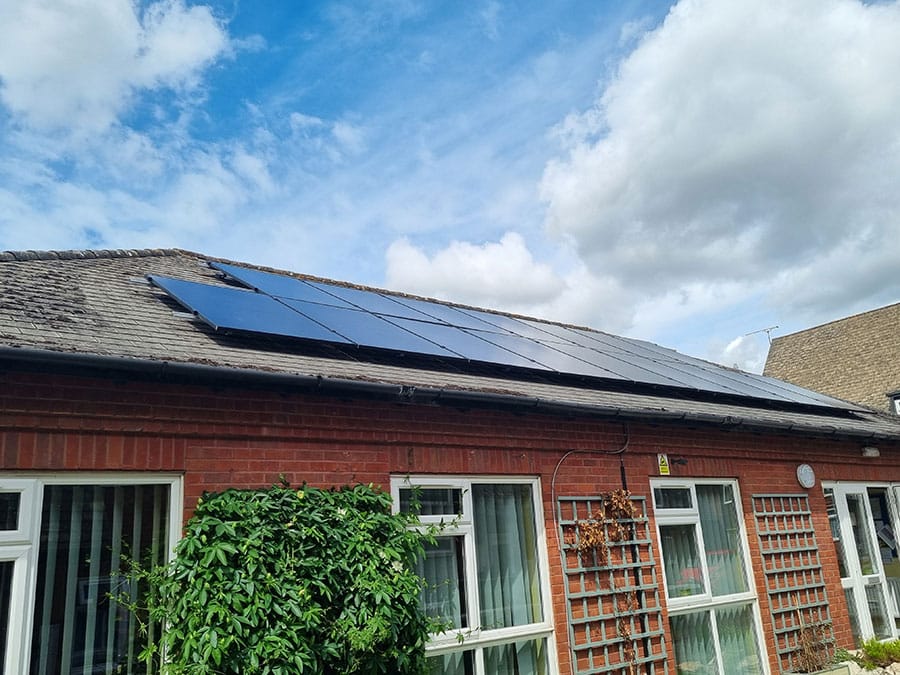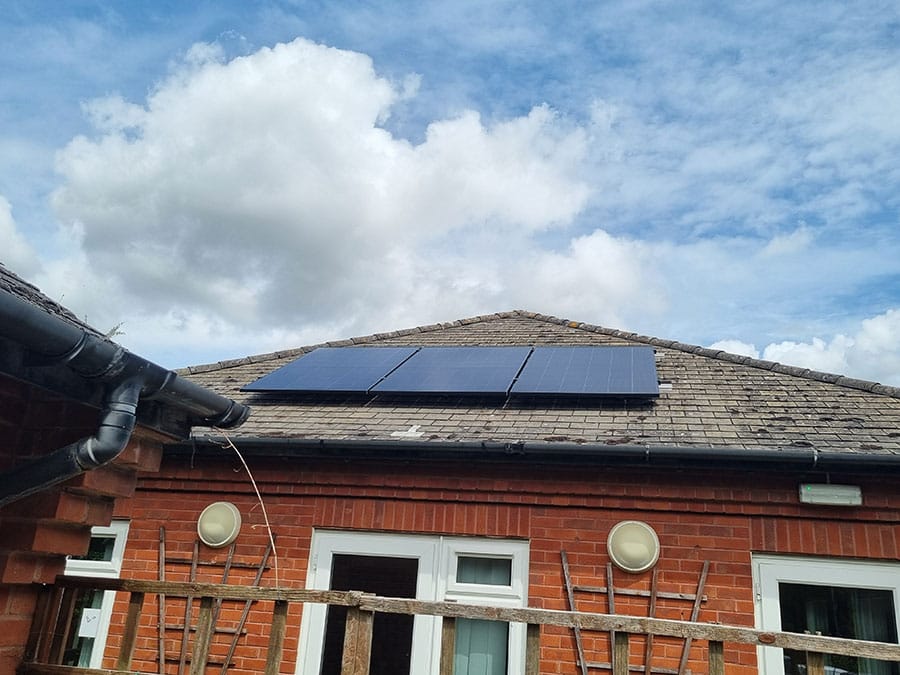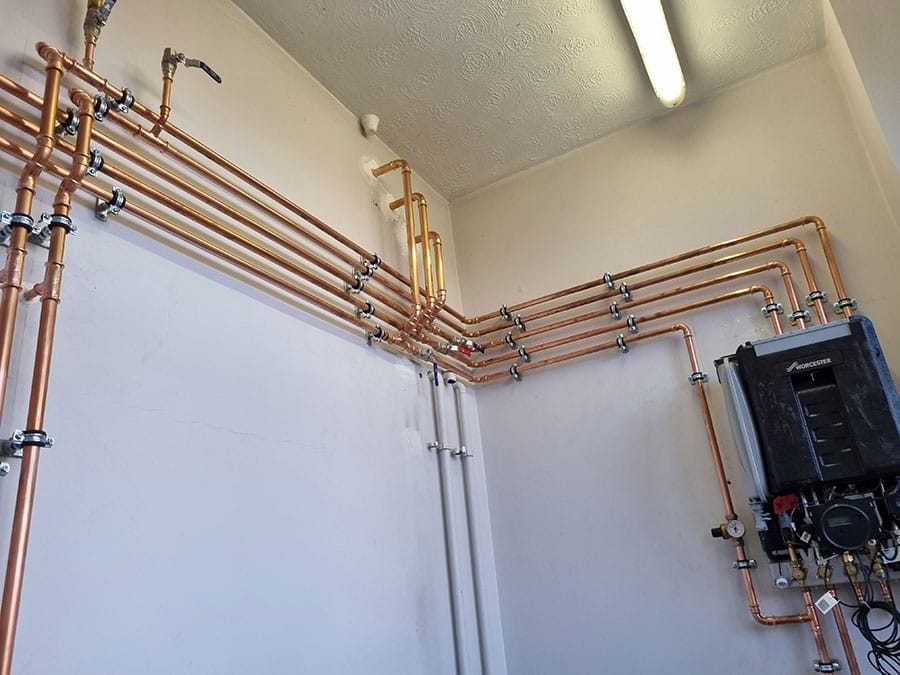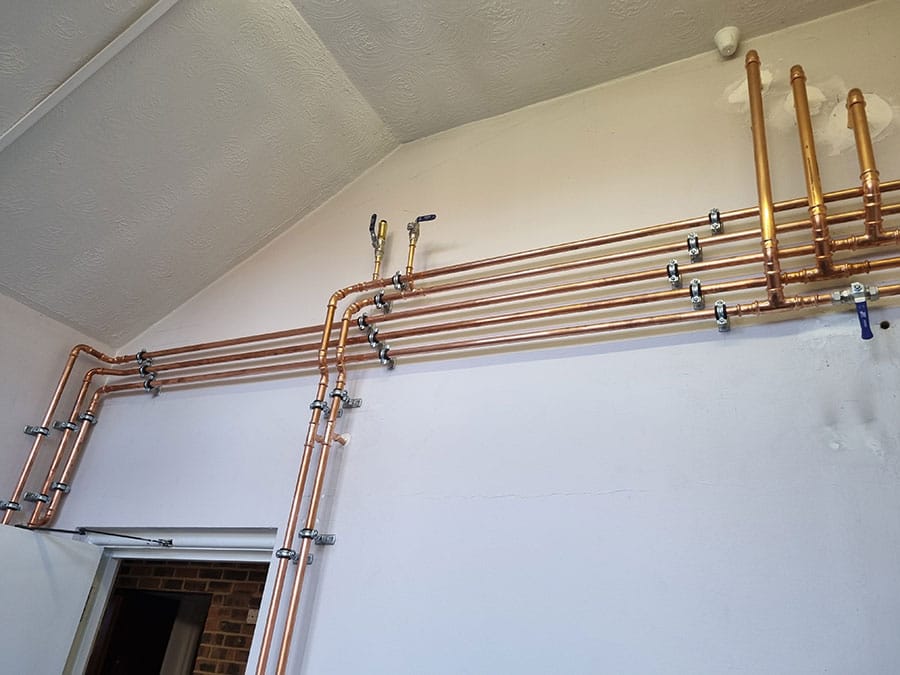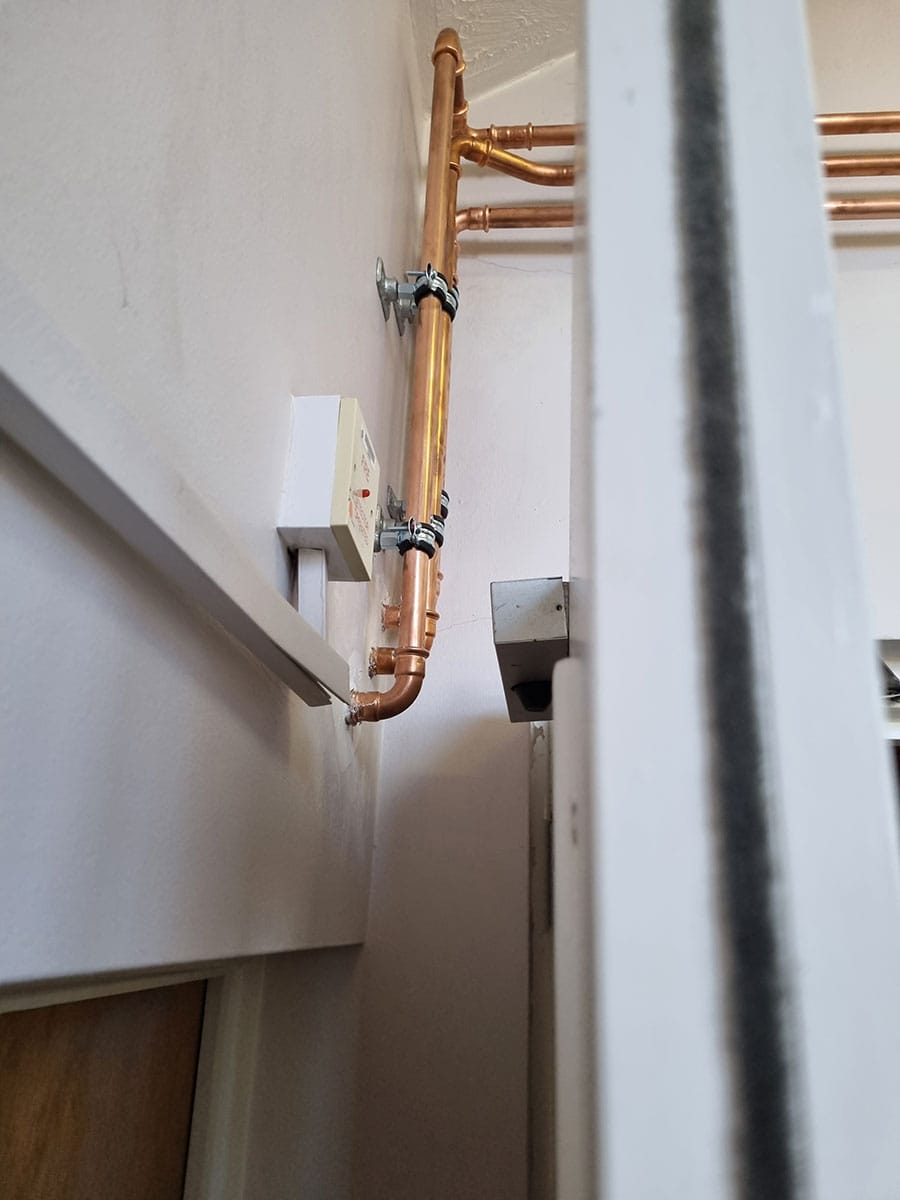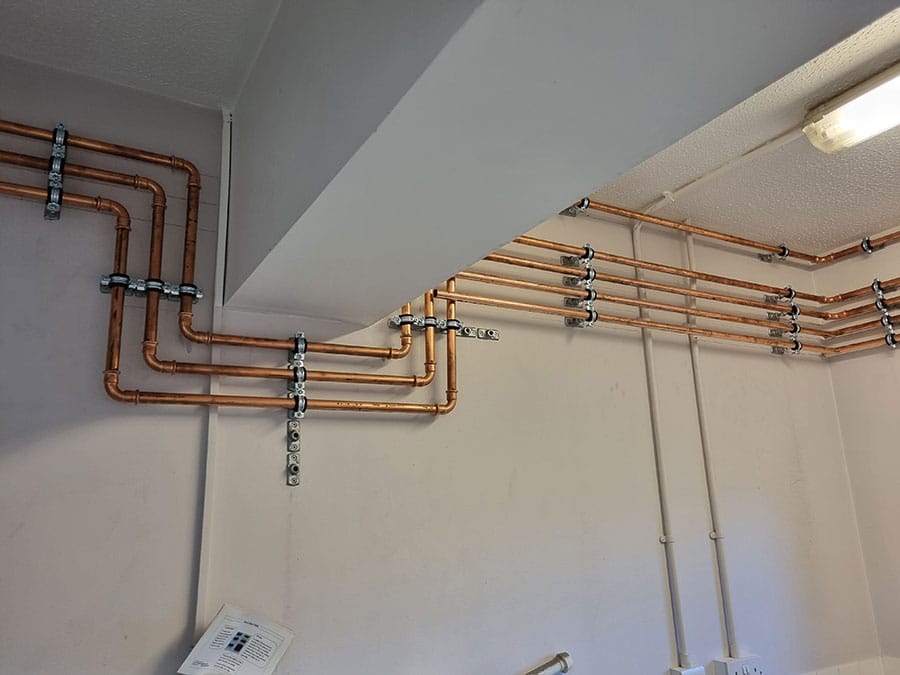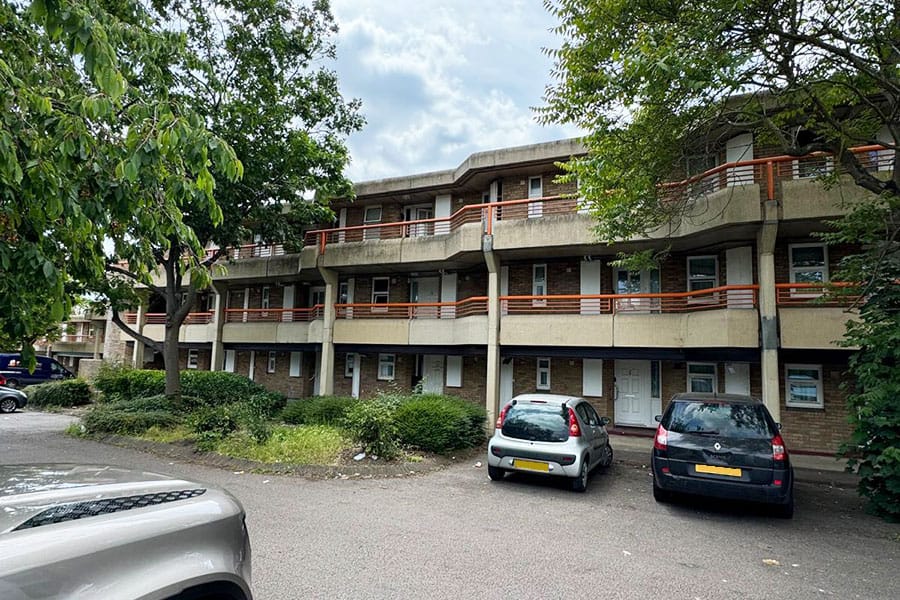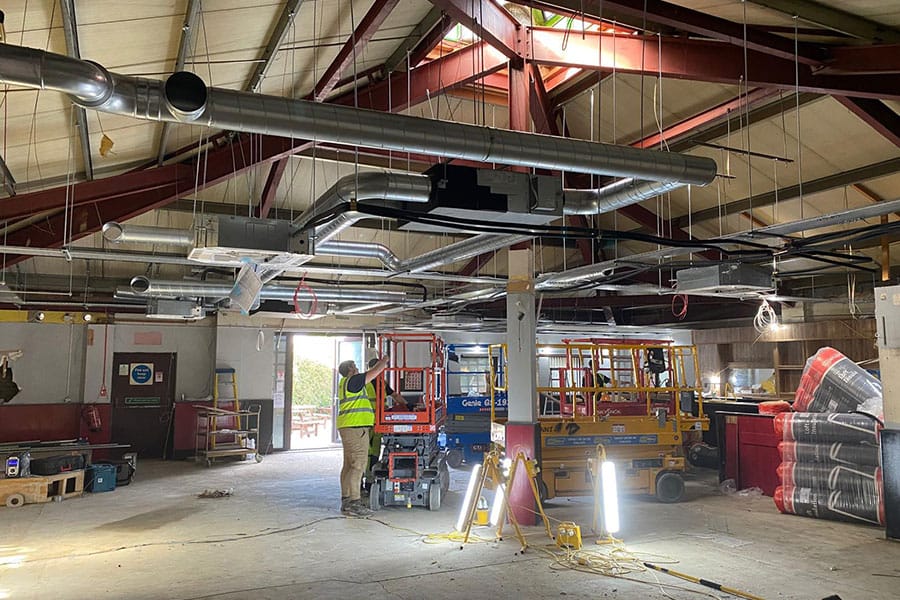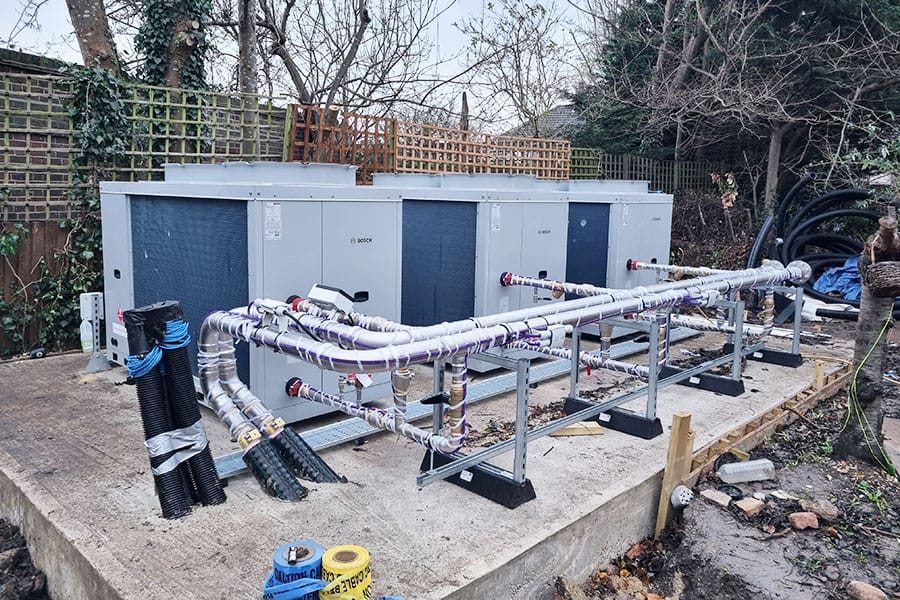Background
Fairhouse Court, a residential property in Basildon, was faced with a serious gas leak that was reported to Basildon Council. The issue prompted an urgent response to ensure the safety of the tenants and rectify the immediate hazard. Upon investigation, it became clear that the gas distribution system had deeper issues, leading to the decision to decarbonise the property by removing the outdated gas boilers and replacing them with more sustainable energy solutions.
The project not only addressed the immediate gas leak and safety concerns but also transformed the heating system by switching to an electric boiler and installing solar energy systems to further reduce the property’s carbon footprint. Additionally, the electrical supply was upgraded to support the new systems and meet the increased demand for electricity. The project required careful coordination between multiple trades and constant adjustments due to the nature of the live, tenanted environment.
Scope of Work
The scope of the Fairhouse Court project was comprehensive, involving emergency repairs, system replacements, and a shift to sustainable energy solutions. The key elements of the project included:
1. Gas Leak Response and Rectification
A swift response to the gas leak that posed a safety risk to the tenants and the property.
Immediate rectification of the leak, which revealed deeper issues with the gas distribution system that required further investigation.
2. Removal of Gas Boilers and Installation of Electric Boilers
The outdated gas boilers were removed and replaced with a modern electric boiler system, providing a more sustainable heating solution.
The transition from gas to electric boilers aligned with the property’s decarbonisation goals, reducing its carbon footprint and reliance on fossil fuels.
3. Solar Energy System Integration
A solar energy system was installed to further support the decarbonisation efforts, reducing electricity costs and providing a renewable source of energy to power the new electric boiler and other electrical needs in the property.
4. Electrical System Upgrades
◦ The electrical system was upgraded to handle the increased demand from the new electric boiler and the additional power requirements of the solar system.
The electrical supply was carefully managed and reinforced to ensure the new systems would function optimally without overloading the existing infrastructure.
5. Coordination of Multiple Trades in Tenanted Properties
The work was carried out in a tenanted environment, requiring the coordination of multiple specialist trades, including plumbing, electrical, and solar installation teams.
Constant adjustments were made to minimise disruption to tenants while ensuring the work was completed safely and on schedule.
Key Challenges and Solutions
Emergency Response to the Gas Leak
The immediate need to address the gas leak was the highest priority, requiring a fast and efficient response. The team quickly rectified the leak to ensure tenant safety.
Upon investigation, the gas distribution system’s issues were uncovered, leading to the decision to decarbonise the property entirely. This unforeseen issue required quick decision-making and adaptation of the project’s scope.
Decarbonisation and System Changeover
The transition from gas to an electric heating system required careful planning and execution, as the existing infrastructure was not designed to support electric heating and solar power.
The installation of the electric boiler and solar system not only required technical expertise but also necessitated significant upgrades to the property’s electrical system to ensure capacity for the new equipment.
Tenanted Property Installations
Working in a live scheme with tenants present required constant coordination and communication to ensure minimal disruption.
The team carefully managed the installation schedule and worked in phases to ensure tenants continued to have access to heating and hot water while the new systems were being installed.
Multiple Specialist Trades Coordination
The project required the coordination of multiple specialist teams, including plumbers, electricians, and solar installers. The challenge of scheduling and managing the work of various contractors was mitigated through detailed planning and close communication between all parties involved.
Project Management and Team Coordination
Due to the complexity of the project and the need for constant adjustments within a live environment, effective project management and coordination were key to its success. The team had to be agile, adjusting the work plan as needed and ensuring that all teams worked efficiently in a phased approach.
Key project management strategies included:
- Detailed scheduling and phased execution to ensure that tenants were minimally impacted and that critical work, such as the gas leak rectification and installation of temporary solutions, was completed first.
- Regular communication with tenants to inform them of the progress and the steps being taken to ensure continuous heating and hot water supply during the transition.
- Coordination of specialist trades with clear timelines and responsibilities, ensuring all works were carried out on time and to specification.
Outcomes and Impact
- Successful Decarbonisation: The switch from gas boilers to an electric boiler system, coupled with the installation of solar panels, has successfully decarbonised Fairhouse Court’s heating and hot water systems. The property is now far more energy-efficient and environmentally friendly.
- Improved Energy Efficiency: The new electric boiler and solar energy system provide reliable and sustainable heating and hot water. The solar panels contribute to reducing the overall electricity demand from the grid, helping lower energy costs for the property.
- Tenant Satisfaction: Despite the complexities of working in tenanted properties, the project team ensured minimal disruption by coordinating work in phases. Temporary solutions were used to provide uninterrupted heating and hot water during the installation process.
- System Reliability and Compliance: The upgrades to the electrical system ensure that Fairhouse Court can now efficiently handle the demands of the new heating and solar systems. The property now meets current energy standards and regulations.
Conclusion
The Fairhouse Court project exemplifies how a rapid response to an urgent issue—such as a gas leak—can evolve into an opportunity to deliver a full decarbonisation solution for a property. The successful transition from gas to electric heating, along with the integration of solar power and necessary electrical upgrades, provides a sustainable, energy-efficient solution for the future.
This case study highlights the ability to manage complex works in tenanted environments, demonstrating our proficiency in coordinating multiple specialist trades, delivering projects on time, and adapting quickly to unforeseen challenges. The Fairhouse Court project is a prime example of how effective planning, coordination, and responsive management can lead to a successful outcome, benefitting both the tenants and the environment.
